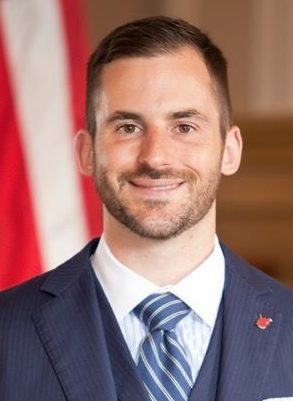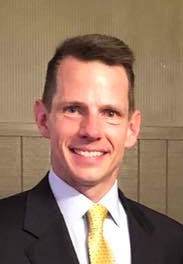Editor’s note: The same five questions were distributed to the candidates running for this particular office. Earlier in the fall, Weelunk solicited questions from you, our readers. Those questions are reflected here in this story. Candidates were invited to offer their answers for publication free of charge. The candidates are presented in the order of ballot position in their respective district. Numerous efforts were made via campaign websites, social media profiles and publicly available contact information and phone numbers to solicit each candidate’s participation.
FOR STATE SENATOR (1st Senatorial District)
RYAN FERNS (R)
What prompted you to run for office?
I was born and raised in the Northern Panhandle. Growing up here, many of my friends talked frequently about moving away when they finished college. I always loved Wheeling and planned to spend my life here so I didn’t understand why this was a common topic of conversation. As I got older, I realized many of my friends and family moved away because of a lack of job opportunities. I ran for office to break that cycle. I want to create an environment in West Virginia that is attractive to job creators who will invest their capital in our state so that if our youth want to stay here they will have career options available to them.
What do you believe to be the most important issues in your race?

The two most important issues in the Northern Panhandle are job opportunities and the opioid crisis, and I believe the two are connected in many ways. As our economy went into decline and many people throughout the Northern Panhandle lost their jobs, many turned to drug abuse because of a sense of hopelessness. Furthermore, as the state’s revenues decrease, there is less funding for treatment and enforcement for the opioid epidemic. Many of our state’s struggles can be traced back to our declining economy. The weaker the economy, the less revenue the state has to address its many needs. Thankfully, because of the changes made over the last four years, our economy is rebounding, and we are experiencing the largest surpluses in the history of our state.
If elected, how will you improve the economy of the Northern Panhandle?
Our economy can thrive when our government gets out of the way. The steps I have taken over the last four years have created an environment in West Virginia that makes our state a better place to do business. We have passed multiple pieces of tort reform to bring our court system in line with the rest of the country. We’ve passed regulatory reform to remove antiquated laws from our books that no longer serve a purpose and are a burden to job creators wanting to invest here. In order to further improve our state’s ability to attract business, we need to modernize our tax structure and improve our education system, and that will be my area of focus if re-elected.
What is the most important message you hope to get across to the voters?
I am a health care professional and small business owner who understands what West Virginia needs to do to be competitive with our surrounding states and the entire country. When I was first elected, West Virginia had experienced six straight years of budget deficits in the hundreds of millions of dollars. In four short years, we went from budget deficits to budget surpluses that are the largest in the history of our state. The changes we made are working, and I intend to continue to pursue those successes until West Virginia is the most prosperous state in the entire nation.
How will you work to move West Virginia forward?
I will continue on the path I began four years ago and pursue reforms that make West Virginia a place that job creators will want to come and invest. I will make sure that our court systems are fair, we have common sense regulations, our tax code is fair for all and our education system has our people prepared for the job opportunities that are arriving every day.
WILLIAM IHLENFELD (D)
What prompted you to run for office/re-election?
I filed to run for State Senate to be a voice for working families in the Ohio Valley. The voices of teachers, law enforcement, blue collar workers, small business owners, and all those in the middle class are not being heard in Charleston, and I hope to change that. There is also lack of leadership at the highest levels of state government (presently there’s no commerce secretary or drug czar), and I want to help fill that void.

What do you believe to be the most important issues in your race?
Jobs and the opioid crisis are at the top of the list, and those two issues go hand in hand. If we can get our arms around the drug epidemic, we’ll not only make our citizens healthier, but we’ll also lift our economy. Job growth is too slow, wages are too low, and poverty is too high. To stimulate the economy, we need to have more workforce participation and better workforce preparation — that is, we need to make sure our people to have the skills necessary to bring in higher-wage jobs. The more jobs we have that pay a living wage, the more hope our people will have, and the less likely they will be to turn to opioids and other drugs.
Corruption must be cleaned up in Charleston. We need an Inspector General’s Office to be the people’s watchdog and to reform the laws that allow Legislators to profit from state contracts.
Tax reform is also an important issue. The Social Security tax needs to be repealed to take the burden off the shoulders of older West Virginians. In addition, out-of-state workers aren’t taxed on the income that they earn in West Virginia. Right now, the oil and gas workers pay income tax to their home states, even though they use our roads, our schools, and our police and fire services. We must act to capture that revenue.
If elected, how will you improve the economy of the Northern Panhandle?
My plan involves a coordinated effort with city councils, county commissions and private groups to ensure that we have good infrastructure and a healthy and well-trained workforce.
I’ll work with our schools, local businesses and trade unions to strengthen our technical offerings and training. Students who opt not to attend college can receive training to enable them to compete for good paying jobs right here at home. We will continue to retrain our displaced workers so that they can support their families. Having access to properly trained, local workforce will entice business development.
From the Senate, I’ll ensure that local leaders have the infrastructure support for that’s necessary to attract new manufacturing opportunities. I’ll also provide the leadership West Virginia needs to combat the opioid crisis because, without a healthy workforce, businesses won’t choose to operate in our region.
I’ll also partner with the Secretary of Commerce to bring in more white-collar jobs, with a focus on the cybersecurity industry.
What is the most important message you hope to get across to the voters?
I’ll be a voice for working families. There are plenty of legislators in Charleston who serve as a voice for corporate interests but not enough who represent the middle class.
How will you work to move West Virginia forward?
I’ll move West Virginia forward by combatting the opioid crisis, cleaning up corruption and cutting taxes. I’ll also help to prepare our workforce to take on high-wage jobs and then bring those jobs to the state through aggressive marketing and via partnerships with local government and the private sector. I’ll make sure that Big Energy pays its fair share and that West Virginia is not taken advantage of by out-of-state corporate interests. I’ll put West Virginia first.



